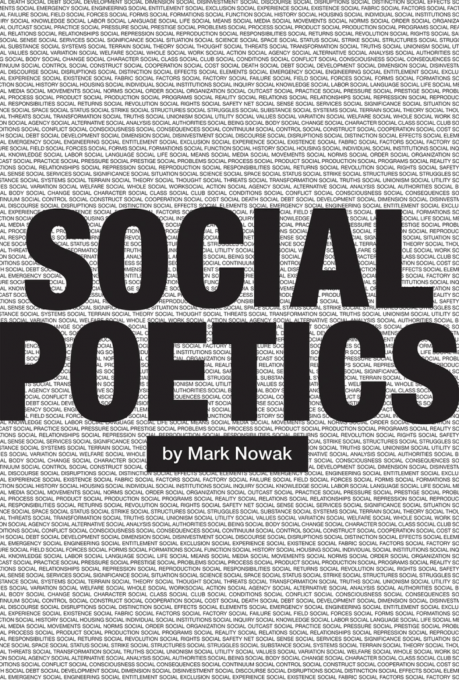Review by Amish Trivedi
In my own work, I am endlessly wrapped up in the university, that nineteenth-century institution which was envisioned as a way of educating those who would have to continue the work of building a democratic state. The university was a place where the citizenry would gain cultural knowledge so they could become educated and would then be able to debate and argue and build consensus in order to try to build a better society. Beginning the third decade of the twenty-first century, it seems that mission may have failed, given way to corporate power, though perhaps we should not give up hope just yet. Regardless, there is something lost in the twentieth-century narrative that revolves only around institutions and organizations, a narrative thread that Mark Nowak brings us back to in Social Poetics.
The university mission has never been, unfortunately, about all citizens—just the ones with enough money and cultural capital to enter into it. Jon Stewart jokingly writes in America: The Book that the Magna Carta codified the idea that no one is above the law (a concept we continue to see dismantled before our eyes) but did not address those below the law—i.e. those who had been left out of discussions of progress in thirteenth-century English society, those who would give their labor and their bodies to build the modern world with little to no recognition. This has not changed: there are those who continue to be left out of the conversation deliberately, forced to rely on their labor as the means by which to engage in society and receive anything from it at all. We see the struggle continuing in our streets (and streets worldwide) this summer, with the Black Lives Matter movement continuing the fight for recognition of those lives, of those narratives that have been pushed to the side, erased, ignored.
The narrative of the university and the field of poetry as housed within it leaves out those who have been systematically kept apart from the university, despite its supposed mission. But Nowak does not forget and has never forgotten, in part due to his own upbringing, but in part because he has unwaveringly utilized his position within the university system and the resources he has put together to help those within our global society who are purposely left out of the conversation about the future. This consists not only of workers in factories and warehouses, but also domestic workers, brought here to labor for no wages and constantly living under threat of harm and deportation. Social Poetics is, in a way, Nowak’s call to arms, his manifesto—the guiding principles behind decades of work and a roadmap for the work of the future. While the movement of this summer has refocused our eyes on one area of the struggle, Social Poetics provides us a way to organize, to build, not merely as poets, but as global citizens.
It begins in some way as a history text. While those of us focused on the university and poetry’s place within it write constantly about workshops for students, a privileged few, Nowak places here the overtone: poetry workshops for those in need of a voice, for those in need of having their work recognized, their lives witnessed, and ultimately, those who ought to be able to organize themselves, the opposite of what the global capitalist system requires for its own survival. In the first full chapter, “A People’s History of the Poetry Workshop” (the title a nod to his hero, Howard Zinn), Nowak draws the history of poetry workshops through the various political and social movements of twentieth century life, the struggles of working individuals, of those seeking their own and others’ civil rights. It is here that it might be helpful to define what Nowak means by “social poetics,” which he sees as the combination of the craft of writing not only with the act of creating a community, but necessarily of the social and communal power behind groups as they recognize that power. Nowak ties this concept back through Langston Hughes, and one can begin to see the way in which there has been that overtone the entire time, right alongside the struck key of the academic workshop machine. If you listen carefully, you too will hear the sympathetic pitch ringing out. That poetry is to be for people is not lost in these pages—it has an emancipatory force behind it, if one can simply listen hard enough.
I had been thinking of a Marx quote right up until I found it in the pages of Social Poetics: “Then begins an era of social revolution,” which is no doubt the idea at the heart of Nowak’s work, both here and the creative work he has published in the last twenty years. Nowak walks his reader through, essentially, a method by which to bring about that social revolution through the field of poetry as it reaches out into the world surrounding it. I am reminded too of a video that Nowak has played for his audiences—that of a Ford factory worker who had been laid off due to the various mechanisms of post-Fordist capitalism. He is an older man, and he is talking about the community that emerged around the workplace, around the factory. A community emerged despite constant forces acting against the notion of organization created in the competitive workplace. He is sobbing, thinking of the people he will miss seeing daily. He is, fortunately, able to write about the experiences, thanks to Nowak’s workshop designed specifically for these workers who have been displaced, who have been cut off from one another for the sake of Ford’s stock. In a way, Nowak’s workshop for those former employees, for domestic workers in New York City, for people across the world now, has shown how we as individuals are not defined in relation to the place where we work, but in relation to one another.
This is nowhere more urgent than in the final chapter, which discusses the poems of those working in China’s various “factories, mines, and other workplaces” which shed a “harsh, realistic light” on the conditions of these employees. Poetry here is the mechanism of social relation, the tool through which workers communicate to one another (and beyond) their individual experiences as they are faced daily with the “grueling, barbarous mode of twenty-first century capitalism.” To further underscore this point on social relation, Nowak brought the poems of these workers into who own PEN Workshops in SoHo, using them as prompts for the workshop attendees. Here, Nowak demonstrates a simple method of creating through building, not of bridging through capital and commodity acquisition, but rather through empathetic understanding of the lives and experiences of others. “What emerges in the practices of social poetics,” Nowak writes, “are not only important new literary works, but also a new class, a new culture, new relationships, and new solidarities.” The idea that poem writing and workshopping can be at the heart of this emergence out to be inspirational, even to the most jaded among us.
Ultimately, Nowak’s own experience is part of what is charming here. That is not to suggest that this text is terribly autobiographical, but that Nowak has consistently engaged in the struggles of workers, and it is through his own actions that we observe the necessities of a social poetics in the present stage of post-Fordist capitalism. This is not a detached theoretical text calling for workers to unite and overthrow a system that only works for a few but instead, Social Poetics is Nowak’s journey through these positions, through labor movements and, in the end, an offering of where the field of poetry ought to turn—back to the community of the disenfranchised and erased. The stories he shares of others’ lives and creative work through these pages are exemplary in the way they model what other poets—or just other humans—could be doing for one another. When we engage in the inner and outer struggles of our fellow humans, there’s an opportunity to move beyond seeing one another as commodities, defined by our labor and production. By giving one another a space to create, participating in the creation, and finding our own challenges given voice, there comes a chance at new emancipation.
Social Poetics
by Mark Nowak
Coffee House Press, March 2020
$18.95 paperback; ISBN: 978-1-56689-567-5
288 pages

